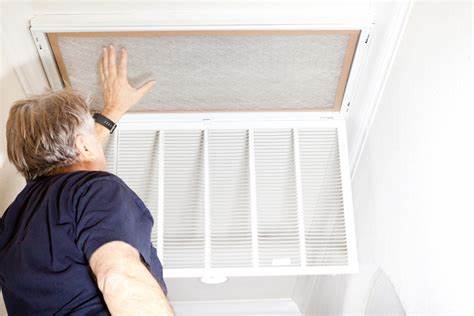Maintaining a commercial HVAC system is crucial for indoor air quality and system efficiency. One essential aspect of maintenance is regular filter replacement. This article will address how often commercial HVAC filters should be changed and the factors influencing this schedule.
Importance of Regular HVAC Filter Replacement
Regular filter replacement is vital to ensure optimal performance of your HVAC system. Neglecting this can lead to various issues, including poor indoor air quality and higher energy costs. Commercial HVAC systems rely on clean filters to operate efficiently and to prevent dust and debris accumulation from damaging the system.
Factors Influencing the Filter Replacement Schedule
Several factors determine the frequency of filter changes in a commercial HVAC system. These include the type of business, the amount of dust and debris in the environment, and the manufacturer’s recommendations.
- Type of Business: Restaurants, manufacturing plants, and other businesses that generate more dust and particles may need more frequent filter changes.
- Environmental Conditions: Areas with high pollution or dust levels can shorten the lifespan of a filter.
- Manufacturer’s Guidelines: Always follow the filter manufacturer’s recommended filter replacement schedule for optimal performance.
Types of Commercial HVAC Filters
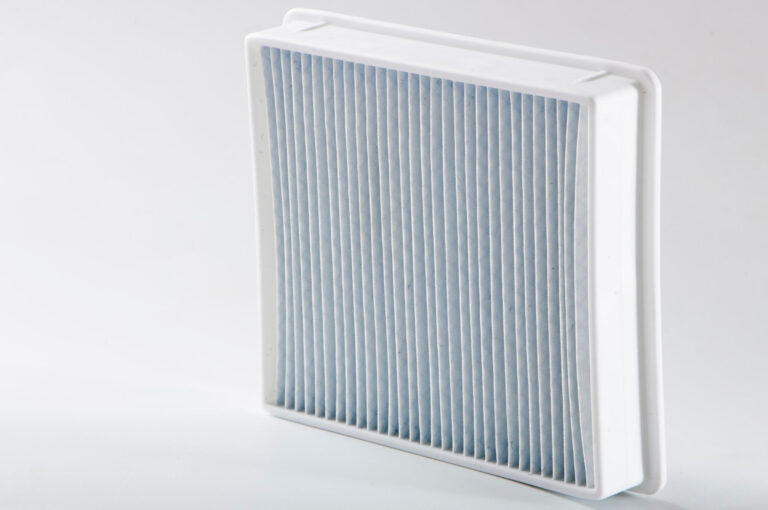
Commercial air filters come in various types, each designed for specific needs. While standalone best air purifiers can supplement air cleaning, integrated HVAC filters are crucial for system health. Understanding the differences between filter types can help you choose the right filter and determine the replacement frequency. Some commercial HVAC systems may even incorporate features similar to the best air purifiers, combining filtration with advanced air cleaning technologies.
1. HEPA Filters
High-Efficiency Particulate Air (HEPA) filters are known for their ability to trap small particles. These are often used in environments where air quality is paramount, such as hospitals and laboratories. HEPA filters are highly effective but may require more frequent replacements due to their fine filtration capabilities.
2. Pleated Filters
Pleated filters have a larger surface area and can trap more particles. They are a common choice for many commercial HVAC systems due to their balance of efficiency and cost. These filters generally need replacement every 3 months, but this can vary based on usage and environmental conditions.
3. Fiberglass Filters
Fiberglass filters are inexpensive and commonly used in many commercial HVAC units. They need to be replaced more frequently, often monthly, as they can become clogged quickly with dust and debris accumulation.
4. Carbon Filters
Carbon filters are used to remove odors and gaseous pollutants from the air. These filters are essential in places where air quality needs to be particularly high. They should be checked and replaced according to the manufacturer’s guidelines to ensure they remain effective.
Recommended Filter Replacement Schedule
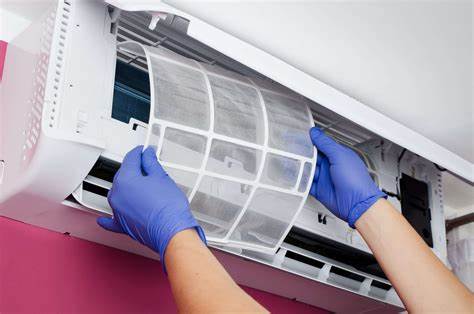
The recommended filter replacement schedule for commercial air filters can vary based on several factors, including the type of commercial property, HVAC system usage, and environmental conditions. This schedule helps maintain optimal air quality and HVAC efficiency in commercial buildings.
Monthly Checks
For most commercial properties, it’s advisable to inspect filters monthly. This proactive approach helps catch potential issues early, preventing dirt and debris from accumulating excessively on the commercial air filter. Monthly checks are particularly important in high-traffic areas or environments with higher levels of airborne particles. During these inspections, property managers should look for visible dirt, dust, or damage to the filter. If a filter appears excessively dirty before the end of the month, it may indicate that more frequent changes are necessary.
Quarterly Replacements
As a baseline, many filter manufacturers recommend replacing commercial HVAC filters at least every three months. This quarterly replacement schedule helps maintain air quality and system efficiency in most commercial properties. Regular replacement keeps the HVAC system running smoothly and prevents it from overworking due to restricted airflow. However, some commercial environments may require more frequent changes, potentially adhering to a “filter monthly” routine.
Signs That Your Filter Needs Replacement
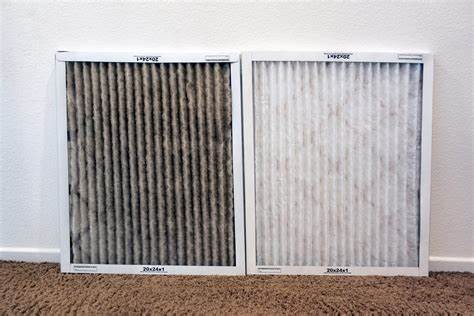
Identifying when a filter needs replacement can prevent issues with your HVAC system. Look for signs such as reduced airflow, increased energy bills, and visibly dirty filters.
Reduced Airflow
A clogged filter restricts airflow, making the system work harder. This can lead to decreased efficiency and higher operational costs.
Higher Energy Bills
Increased energy consumption can indicate the HVAC system is struggling with a dirty filter. Regular checks can help avoid unexpected spikes in energy usage.
Visible Dirt
A visibly filthy air filter needs immediate replacement to prevent damage to the HVAC unit. Regular visual inspections can help identify when a filter is too dirty.
Common Mistakes in Commercial HVAC Filter Replacement
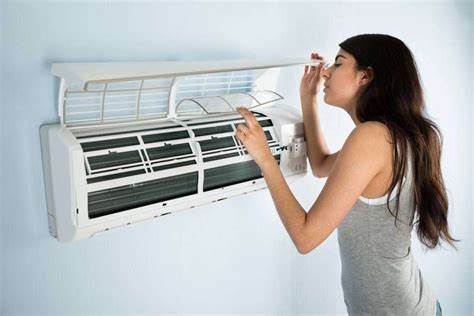
Neglecting to change commercial HVAC filters can lead to several problems, including decreased indoor air quality and increased wear and tear on the HVAC unit. One filthy air filter can compromise the entire system, leading to costly repairs and downtime. Regular maintenance ensures that the HVAC system remains efficient and reliable.
Many HVAC systems in commercial properties suffer from improper filter maintenance. Here are some common mistakes to avoid:
- Using the Wrong Filter Type: Always use the correct commercial HVAC filter as recommended by the manufacturer for your specific commercial air conditioning unit.
- Irregular Filter Changes: Neglecting regular filter replacement can lead to poor air quality and inefficient operation. Consider a filter change monthly or as often as recommended for your commercial HVAC unit.
- Improper Installation: Incorrectly installed filters can allow air to bypass the filter, reducing its effectiveness. Ensure proper installation to maintain optimal performance.
Benefits of Using Maintenance Sensors
Maintenance sensors have revolutionized the way commercial HVAC systems are monitored and maintained, particularly when it comes to filter management. These innovative devices can continuously track the condition of commercial HVAC filters, providing real-time data and timely alerts when it’s time for a replacement. By implementing maintenance sensors, facility managers and HVAC technicians can ensure that filters are changed before they become excessively dirty, thus maintaining optimal system efficiency and indoor air quality.
This method allows for more accurate and timely filter replacements, which can lead to significant benefits:
- Improved energy efficiency: Clean filters allow for better airflow, reducing the strain on the HVAC system and lowering energy consumption.
- Enhanced indoor air quality: By replacing filters before they become overly saturated, maintenance sensors help maintain cleaner air throughout the facility.
- Cost savings: Timely filter changes can prevent unnecessary wear and tear on HVAC equipment, potentially reducing repair and replacement costs over time.
- Reduced manual labor: With sensors providing accurate data, the need for frequent manual inspections is minimized, allowing maintenance staff to focus on other critical tasks.
- Optimized filter life: By replacing filters based on actual conditions rather than a fixed schedule, facilities can maximize the useful life of each filter without compromising system performance.
- Environmental benefits: More efficient HVAC operation and optimized filter use can contribute to a reduced carbon footprint for the facility.
Implementing maintenance sensors can lead to a more proactive and efficient approach to HVAC filter management. This technology eliminates guesswork and reduces the risk of overlooking necessary filter changes. As a result, commercial buildings can maintain healthier indoor environments, improve energy efficiency, and potentially realize significant cost savings over time.
Elevate Commercial HVAC Performance Through Strategic Filter Changes
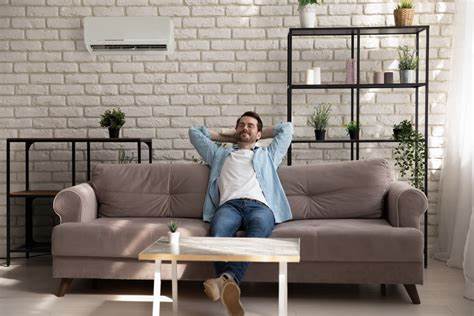
Regular filter replacement plays a significant role in maintaining good indoor air quality. Clean filters trap dust, pollen, and other particles, ensuring a healthier environment. This is particularly important in commercial properties where air quality directly affects employee health and productivity.
Regular replacement of commercial HVAC filters is crucial for maintaining system efficiency and indoor air quality. By understanding the factors that influence filter replacement schedules and recognizing the signs of a dirty filter, you can ensure your HVAC system operates optimally. Proper maintenance ensures that many commercial HVAC units continue to provide clean, healthy air for years to come.
Don’t let your commercial HVAC system’s performance suffer from neglected filters. Callidus Air is here to help you maintain peak efficiency and superior air quality. Our expert team can assess your current filter condition, recommend an optimal replacement schedule, and handle all your commercial HVAC needs.

